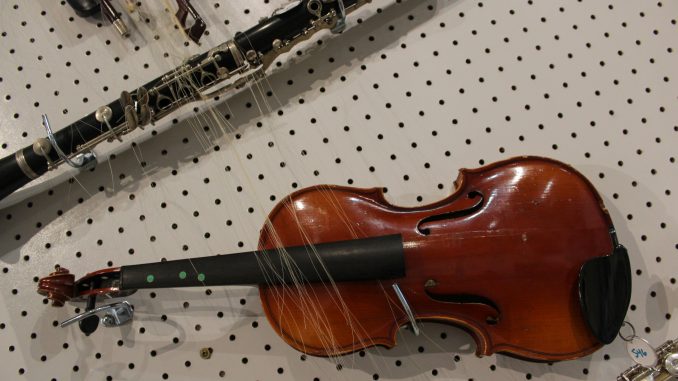
The Symphony for a Broken Orchestra began when Robert Blackson, the director of exhibitors and public programs at the Tyler School of Art, came across a room of abandoned pianos in the now-closed Edward W. Bok Technical High School on 8th Street near Mifflin.
“That caused me to ask the question, ‘How many instruments are out there [owned] by the district that are in some state of disrepair that aren’t being used?’” Blackson said.
SFABO is a two-year initiative with three phases, starting with the exhibition of more than 800 broken instruments donated by the School District of Philadelphia in Temple Contemporary.
Next, sounds made by the broken instruments will be recorded and sent to David Lang, an Academy Award recipient and Pulitzer Prize winning composer, who will create a composition that nearly 400 musicians from Philadelphia will perform next fall. All of the instruments will then be repaired and returned to the School District of Philadelphia for students’ use by Fall 2018.
Temple Contemporary received a $300,000 grant from the Pew Center for Arts & Heritage to fund SFABO’s concert. The Barra Foundation will also support the project with a $180,000 grant to fund the repairs of instruments and the distribution of music repair kits to teachers in Philadelphia.
Hester Stinnett, the interim dean for the Tyler School of Art, said the broken instruments hanging on the walls of Temple Contemporary are a symbol of loss and missed creative opportunities.
“I hope our mission within Tyler and within Temple is to not only serve our community of students and faculty and staff, but also to bring art to a much wider audience,” Stinnett said. “Art is part of the world…so we want our gallery to engage with the community.”
Blackson said the instruments in Temple Contemporary came from all over the city, and the musicians that will perform Lang’s composition have backgrounds ranging from Mummers to high school students.
He added that the diversity of the project’s participants reflects how music “means a lot of different things for a lot of different people.”
“This is about the next generation of Philadelphia musicians,” he said. “Some want to study to be an orchestral musician. … Others want to use it as a community gathering effort and play in their local band. Other people see it as a way to meet new people.”
Frank Machos, the executive director of the Office of Music Education for the School District of Philadelphia, said SFABO is an innovative way to call attention to the district’s funding issues.
While the district has begun offering students more modern instruments, like guitars or keyboards, Machos said SFABO highlights the traditional roots of the School District of Philadelphia’s music programs by displaying orchestral instruments, like the violin and clarinet.
Once the project is completed, Machos said repairs of the instruments will allow about 1,000 more students, who are currently on a waiting list, to play an instrument.
“Creativity is certainly something we are trying to express to our students,” Machos said. “We’re really just intending to make the experience for kids’ school community to feel more culturally relevant…and making sure the arts are reflected.”
Blackson said art institutions often “have painted themselves into a corner” when creating new projects because they jump from exhibition to exhibition without thinking about art’s long-term impact on the community.
“What we’re trying to instill is to teach people how to think,” Blackson said. “This is what it means to be an engaged citizen in the world, that you look at what’s around you and you see what you can try to help. You try the best that you can.”
He added that SFABO’s mission is reminiscent of Temple Contemporary straying away from “business as usual” as a gallery.
The Advisory Council — a 35-member group that includes high school students, community residents and Temple students with a varying set of interests — helps determine the issues on which Temple Contemporary’s exhibitions and projects will focus.
De’Wayne Drummond, a member of the Advisory Council who lives in the Mantua section of West Philadelphia, posed the question, “If the walls of closed public schools could talk, what would they say?” to the group two years ago, which fueled Blackson’s interest in the subject.
When he was a second grader at Morton McMichael School in Powelton, Drummond said he played the violin, but the program shut down when he was in third grade. His daughter De’Anna now plays the violin as a third grader at Samuel Powel Elementary, also in Powelton.
Drummond said projects like SFABO ensure his daughter will have music enrichment throughout her education.
“Programs like this in music are in place so that [students] can be successful…and be vibrant in whatever they do,” Drummond said. “[Kids] are like flowers. They grow, they blossom, they produce.”
At the heart of the project, SFABO shows something broken is something to be reimagined, Blackson said.
“You can make something beautiful and remarkable out of something that is maybe seen as trash or as a hindrance to creativity,” Blackson said.
Grace Shallow can be reached at grace.shallow@temple.edu or on Twitter @grace_shallow.
Editor’s note: Supervising Editor Michaela Winberg serves on the Temple Contemporary’s Advisory Council. She played no role in the reporting of this article.


Be the first to comment